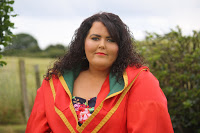PhD Defenses around the world: a Defense in Northern Ireland
 Today, I have the pleasure of inviting Dr Carole Trueman to share the story of her PhD Defense, Dr. Trueman is a recent PhD graduate from Northern Ireland. She has started an educational consultancy business called Clarity Consultancy NI. Carole’s business offers bespoke training, accredited courses, and business / educational research and consultancy services. As well as this, Carole offers advice and support to students on their university assignments and career options. You can find her on Twitter and Facebook
Today, I have the pleasure of inviting Dr Carole Trueman to share the story of her PhD Defense, Dr. Trueman is a recent PhD graduate from Northern Ireland. She has started an educational consultancy business called Clarity Consultancy NI. Carole’s business offers bespoke training, accredited courses, and business / educational research and consultancy services. As well as this, Carole offers advice and support to students on their university assignments and career options. You can find her on Twitter and Facebook
I never thought I would be able to say that I enjoyed my PhD defence (or viva as we call it in Northern Ireland). I had been told horror stories, from the viva that lasted six hours, to the student that was so nervous they couldn’t say a word! Now, I know these were extreme cases but I didn’t hear too many stories that were pleasant.
I knew that I was going to have a hard time, my supervisors were openly honest that my thesis was not perfect. As my viva approached I did considerable preparation. This is an important part of the process. I re-read my thesis highlighting key points / buzz words and also wrote a paragraph on the general argument from each chapter. I ordered viva cards and prepared answers to each question and practiced them orally to be confident in my answers. I asked my supervisor to point out the weakest parts of my thesis so I could practice justifications for them. I searched many websites for additional questions that could be asked and I read viva preparation books such as Nathan Ryders book “Fail your Viva”. I was prepared, I had always been told “to fail to prepare, is to prepare to fail”. I even had a mock viva with my supervisors a couple of weeks before the viva, which helped as it highlighted the areas that I was uncomfortable with, which I worked on improving my answers for. As suggested to me, the night before my viva I did not study. Instead I relaxed, pampered myself and tried not to think about what was ahead of me.
The morning of my viva I was very glad that I allowed my supervisor to attend, as I wasn’t alone, it was a comfort. My panel consisted of my external examiner, internal examiner from my university, and a member of staff who chaired the viva. Although it was formal, I was extremely lucky as both examiners were lovely and put me at ease straightaway. There are a few general questions to start with for example summarising my thesis, what motivated me to carry out this research and which theories and research most influenced my work. I expected the process to be intimidating but it was instead more like a professional conversation with people who were genuinely interested in my work. It was lovely to share ideas, thoughts, future plans, and I even asked their opinions on aspects of the research. Yes, I was asked difficult questions, but nothing that I could not answer. There were some I paused for a minute to think about, and some I had to ask the examiners to repeat but that was ok, it’s better to take time than rush an answer! I did justify my research and the routes I took but I was open to their ideas and changes that I could make. I was questioned about my conclusions in particular and the panel came up with very interesting ideas on some improvements I could make. My viva lasted 1 hour 30 minutes approximately. It was quite short and I didn’t know if that was good or bad. I had to wait in an office next door to the viva room and await my fate. I had to wait 20 minutes which trust me felt like a lifetime. Eventually I was called back into the room and told that I had passed with minor corrections. I was that shocked I asked the chair to repeat what she said! Everything after that is a bit of a blur (which is another reason it was nice to have my supervisor with me)! I just couldn’t believe it was over.
I had a lovely defence, but one key thing that got me through and gave me confidence in my work was this advice I kept telling myself – “No one knows your research better than you do, you are the expert of your PhD“.
